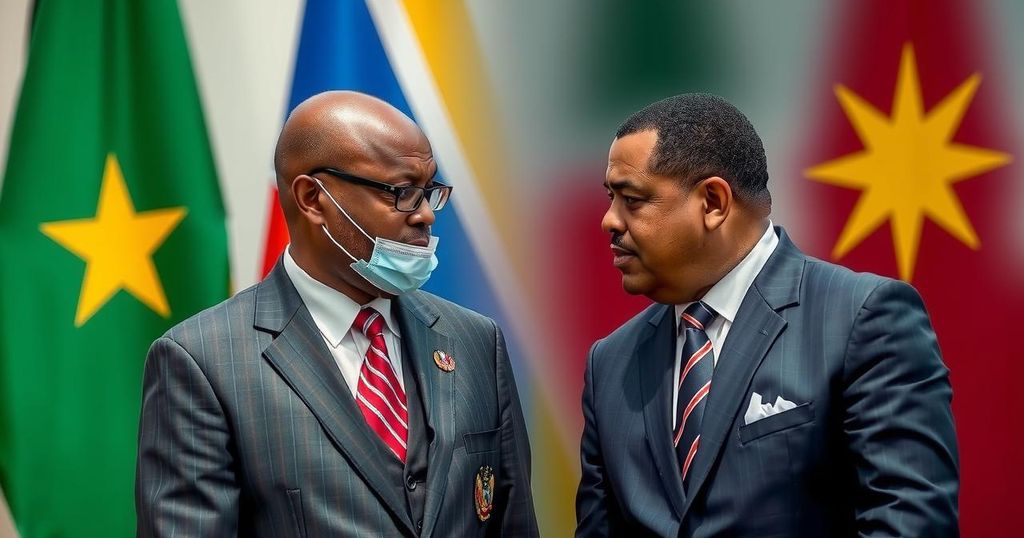Somalia’s President Hassan Sheikh Mohamud has turned to foreign mediation in a domestic dispute by requesting Kenyan President William Ruto to facilitate discussions with Jubaland leader Ahmed Madobe regarding term extensions for federal leaders. The involvement of Kenya has raised questions about Somalia’s sovereignty and highlights the challenges Mohamud faces in direct negotiations with regional leaders amidst mounting political pressures.
On October 27, Jubaland President Ahmed Mohamed Islam, commonly referred to as Ahmed Madobe, arrived in Nairobi after being flown in by a Kenyan government plane from Kismayo, according to multiple reliable sources as reported by Garowe Online. During his visit, Madobe engaged in a confidential discussion with Kenyan President William Ruto and the head of Kenya’s intelligence, Noordin Haji. This meeting followed a request made by Somalia’s President Hassan Sheikh Mohamud during his recent official trip to Kenya. President Mohamud is said to have sought Kenya’s assistance in persuading Madobe to approve a proposal from Villa Somalia regarding unconditional term extensions for certain federal member state leaders—an initiative that Madobe is believed to oppose. These term extensions are seen by Villa Somalia as crucial to Mohamud’s broader political agenda as he approaches the conclusion of his term. Political observers analyze that these proposed extensions may be tactically aimed at securing alliances with federal member state leaders, thereby potentially facilitating Mohamud’s own term extension ambitions. The involvement of Kenya in addressing Somalia’s internal disputes has been interpreted by some Somali political analysts as a significant miscalculation on President Mohamud’s part. They argue that his reliance on foreign intervention suggests an inability to negotiate directly with the regional leaders of Somalia, raising concerns about the sovereignty of the nation. This development has incited unease among members of the Somali diaspora residing in Kenya, who fear that such actions could undermine Somalia’s independence. While the specifics of the discussions between Presidents Ruto and Madobe remain ambiguous, it is noted that logistical delays will keep Madobe in Nairobi for at least one additional night following his arrival. This diplomatic initiative arrives at a time when relations between the Somali federal government and Ethiopia have become increasingly fraught, particularly amid allegations of external interference in Somalia’s domestic affairs. Blending domestic challenges with complicated foreign relations, President Mohamud’s strategy to solicit Kenya’s aid introduces further intricacies into Somalia’s already complex political landscape.
The current political climate in Somalia is characterized by significant tension and instability, particularly as President Hassan Sheikh Mohamud approaches the end of his term. His government faces growing criticism regarding its ability to directly engage and negotiate with regional leaders. Amidst these challenges, Mohamud’s decision to seek foreign mediation from Kenya exemplifies his government’s dependency on external powers to navigate internal conflicts. This situation sheds light on broader implications concerning national sovereignty and regional relations, particularly how foreign involvement may influence domestic political dynamics.
In conclusion, the involvement of Kenya in Somalia’s internal political disputes underlines significant challenges facing President Hassan Sheikh Mohamud’s administration. The reliance on foreign mediation highlights governance struggles within Somalia, as well as growing concerns about national sovereignty and the political tactics being employed as elections approach. The outcomes of the discussions between Kenyan and Jubaland leadership remain to be seen, but the implications for Somalia’s political landscape could be profound.
Original Source: www.garoweonline.com






